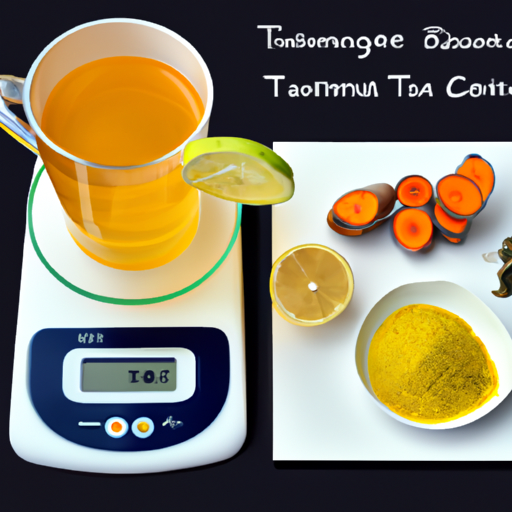As someone who prioritizes their health, I have continuously explored different methods to enhance my overall well-being. One recent trend that has piqued my interest is turmeric tea, a comforting and healing beverage that offers a variety of health advantages.
However, as someone who is sensitive to caffeine, I couldn’t help but wonder: does turmeric tea contain caffeine?
In this article, I will explore the answer to this question and provide you with an evidence-based explanation. We will delve into what turmeric tea is, its potential health benefits, and whether it contains caffeine. Additionally, I will guide you through a simple recipe to make turmeric tea at home, so you can try this delicious and healthy beverage for yourself.
So, let’s get started!
Key Takeaways
- Turmeric tea is naturally caffeine-free.
- It is a great alternative for those sensitive to caffeine or wanting to avoid it.
- Other caffeine-free alternatives include chamomile tea, peppermint tea, or rooibos tea.
- Turmeric tea is often recommended as a soothing and relaxing drink before bedtime.
What is Turmeric Tea?
Turmeric tea is a delicious, caffeine-free beverage made from boiling turmeric root in water. It has been gaining popularity in recent years as a natural remedy for various ailments. However, some may wonder if it’s just a trend or if it actually has a place in traditional medicine.
Turmeric tea has been used in Ayurvedic medicine, a traditional system of medicine in India, for centuries. Ayurvedic practitioners believe that turmeric can help with digestion, inflammation, and even skin conditions. While more research is needed to fully understand the benefits of turmeric tea, it’s clear that it has a long history of use in traditional medicine.
So, what are the health benefits of turmeric tea? Let’s explore.
The Health Benefits of Turmeric Tea
You’ll be pleasantly surprised by the range of health benefits that this vibrant yellow beverage can offer. Turmeric tea is packed with antioxidants, anti-inflammatory, and anti-cancer properties, making it a powerful drink for improving overall health.
Some of the key benefits of drinking turmeric tea include reducing inflammation, boosting immunity, improving brain function, reducing the risk of heart disease and cancer, and aiding digestion.
To reap the full benefits of turmeric tea, it’s important to use high-quality turmeric powder and other complementary ingredients like ginger, black pepper, and cinnamon. There are many different recipes for turmeric tea, but a simple recipe involves boiling water, adding turmeric powder, a pinch of black pepper, and sweetener of your choice, and allowing it to simmer for a few minutes. You can also experiment with different ingredients to create your own unique turmeric tea recipe.
Moving on to the next section about whether turmeric tea contains caffeine, it’s important to note that caffeine is a stimulant found in many beverages like coffee and tea.
Does Turmeric Tea Contain Caffeine?
If you’re looking for a caffeine-free beverage, turmeric tea may be just what you need. Unlike many other teas, turmeric tea is naturally caffeine-free, making it a great alternative for those who are sensitive to caffeine or want to avoid it altogether.
In fact, turmeric tea is often recommended as a soothing and relaxing drink to enjoy before bedtime. While many herbal teas contain caffeine, turmeric tea is made from the root of the turmeric plant, which does not contain caffeine. This means that you can enjoy the many health benefits of turmeric tea without the jitters or sleep disturbances that caffeine can cause.
If you’re looking for other caffeine-free alternatives to turmeric tea, consider trying chamomile tea, peppermint tea, or rooibos tea, which are all naturally caffeine-free and offer their own unique health benefits. To learn how to make turmeric tea at home, all you need is some fresh turmeric root, water, and your favorite sweetener.
How to Make Turmeric Tea at Home
Get ready to indulge in a soothing and comforting beverage that’ll help you unwind after a long day – making turmeric tea at home is easier than you think!
Not only is it delicious, but it also provides numerous health benefits. Turmeric is known for its anti-inflammatory and antioxidant properties, which can help reduce inflammation, improve brain function, and boost immunity.
To make turmeric tea, start by boiling 2 cups of water in a saucepan. Add 1 teaspoon of turmeric powder and stir well. Let the mixture simmer for 5-10 minutes. You can also add other ingredients such as ginger, honey, or lemon to enhance the flavor and health benefits.
Once done, strain the tea and serve hot.
There are also various variations of turmeric tea recipe that you can try, such as turmeric latte, turmeric lemonade, or turmeric chai. Experiment with different ingredients and find the recipe that suits your taste buds.
With its warm and comforting aroma, turmeric tea is perfect for any time of the day and can be enjoyed alone or with friends and family.
Frequently Asked Questions
Can turmeric tea be consumed by pregnant women?
Pregnancy is a time of growth and nurturing, and turmeric tea can be a beneficial addition to a healthy diet. Studies suggest turmeric tea benefits include reducing inflammation and aiding digestion. However, it’s best to consult with a healthcare provider before consuming any new food or beverage during pregnancy.
What are the possible side effects of drinking turmeric tea?
I have researched the potential side effects of drinking turmeric tea and found that digestive discomfort is a possibility. It is also important to be cautious of any interactions with medication. However, these effects are generally rare and mild.
How much turmeric should be used to make a cup of turmeric tea?
To make a delicious cup of turmeric tea, I recommend using 1 teaspoon of ground turmeric per cup of water. Add black pepper and honey to enhance flavor and health benefits. Is turmeric tea just a trend or golden goodness?
Does turmeric tea have any impact on blood sugar levels?
Turmeric tea benefits blood sugar levels and has anti-inflammatory properties. Turmeric tea recipes vary, but a common ratio is 1 teaspoon of turmeric for every 2 cups of water.
Can turmeric tea be consumed as a substitute for medication?
Turmeric tea has potential benefits for various health conditions, but it should not be substituted for medication without consulting a healthcare provider. Dosage and duration of use should also be discussed with a professional.
Conclusion
In conclusion, turmeric tea is a wonderful and healthy beverage that’s easy to make at home. I highly recommend adding it to your daily routine to reap the many benefits it has to offer, including reducing inflammation and boosting immune function.
Now, some may argue that the taste of turmeric tea is too strong or bitter. However, there are many recipes and variations available that can help make the taste more palatable. Additionally, adding natural sweeteners like honey or stevia can also help make the tea more enjoyable.
Overall, the benefits of turmeric tea far outweigh any potential taste concerns. So why not give it a try and see how it can improve your overall health and well-being?
Does turmeric tea contain caffeine?










